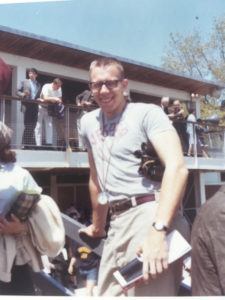With memories flooding back (and a few tears, too), Linda Rakowski met with me at the Vesper Boat Club the other day, to reminisce about her late husband’s Olympic quest in 1964. Bob Rakowski had been recruited four years earlier by Cornell University’s crew as a freshman. He revered his storied coach, Harrison Sanford, who guided Bob’s JV crew to win the 1963 Eastern Sprints.
With his sights on the Olympics, Bob came to Vesper that summer to train and compete. John B. Kelly Jr. was assembling what many would later call a “motley crew”– working strings to get rowers doing military service in Southeast Asia (think windup to Vietnam) the dispensation to train at Vesper, including former Cornell stroke Bill Stowe. Also training were a 45-year-old Hungarian refugee cox, a couple of LaSalle College kids barely 20. and a 34-year-old father of six.

“I don’t recall the story of how Bob learned about Vesper,” Linda said, though clearly Kelly had his eye on some of the strong Cornell rowers, according to letters she has kept. In October 1963, Kelly had written Bob, back at Cornell and rowing in a four, saying, “Concerning you and your friends in Cornell, nothing would delight us more than to have you with us for the Olympic Trials next year. We had what I think were a couple of weak spots in our crew this year, that could be improved upon and I am sure you and any of your boys… could help us alleviate.”

A month later, in a “To whom it May Concern” letter, Kelly asked that four Cornell rowers –Walter E. Klippert II, Albert F. Thomasson, Anthony C. Taylor and Robert F. Rakowski–”currently in the R.O.T.C.” and set to be commissioned in June, “receive a deferment from active duty until the Olympic Trials are over.”
On Jan. 8, 1964, Kelly wrote again to Bob: “I hope you will get back in training as soon as possible so that we can have a really top year in 1964.” Bob was busy finishing his fifth year in engineering at Cornell and getting engaged to Linda. (The announcement was in the New York Times just 10 days after Kelly wrote.)

Bob arrived back at Vesper just weeks before the July 6 Olympic trials and a few months before the October Olympics in Tokyo. Others, including Tom and Joe Amlong , Emory Clark and Boyce Budd, had been training at Vesper all winter. By March, Stowe, a Navy lieutenant, had arrived. After graduation, Bob returned to Philadelphia and the two Cornelians roomed together for a bit. “Bob’s passion was tennis and ironically Bill Stowe made off with Bob’s precious tennis racket,” said Linda.
So the Olympics were a long shot for Bob. By then, Vesper’s got “their lineup of what will be the Olympic crew,” Linda said, “and he’s stroking the B boat in the Independence Day Regatta, the alternate Vesper. As of the 4th of July, that’s the situation.”
I asked Linda how Bob must have felt, rowing in the “B boat” and ultimately not making it to the Olympics. “He had a glimmer of hope that he might make the eight and a glimmer of hope that, if not the eight, there might be a small boat that he could compete in,” she said. “Bob was disappointed not to be selected as spare in the eight. Still, he was proud to be part of Vesper’s effort to win at the Olympic trials. He was confident that Jack Kelly could make it happen.”
During that summer, when Bob took a couple days off in July to get married, he would tell Linda that sometimes the A boat would slough off in practice sessions, that his B boat was working harder than them. It was frustrating, but he realized that their effort was pushing the A boat to be even better. In fact, his eight-oared B boat was so fast, it won the President’s Cup on the Potomac River that August as the Olympics-bound A crew rested.
“It was being part of something bigger than himself,” Linda said. He came to love Vesper, which “drew him in in ways that I must say I can’t really express. … He was treated so well and fairly and welcomed.”
The A boat went on to Olympic glory [see the “Vesper Eight” chapter in my book], Bob Rakowski went on to four years in the Air Force and the discovery that he had a heart condition known as IHSS. “Rowing was out,” Linda said, along with other serious aerobic exercise. Bob poured his energy into his career in biophysics, later becoming chairman of biophysics and physiology at The Chicago Medical School.
I walked Linda around the Vesper boathouse, which she had never been inside before, and we scrutinized all the photos from 1963 and ’64 to see if we could find Bob on the wall. No such luck. But she was glad to have relived that time and his story.